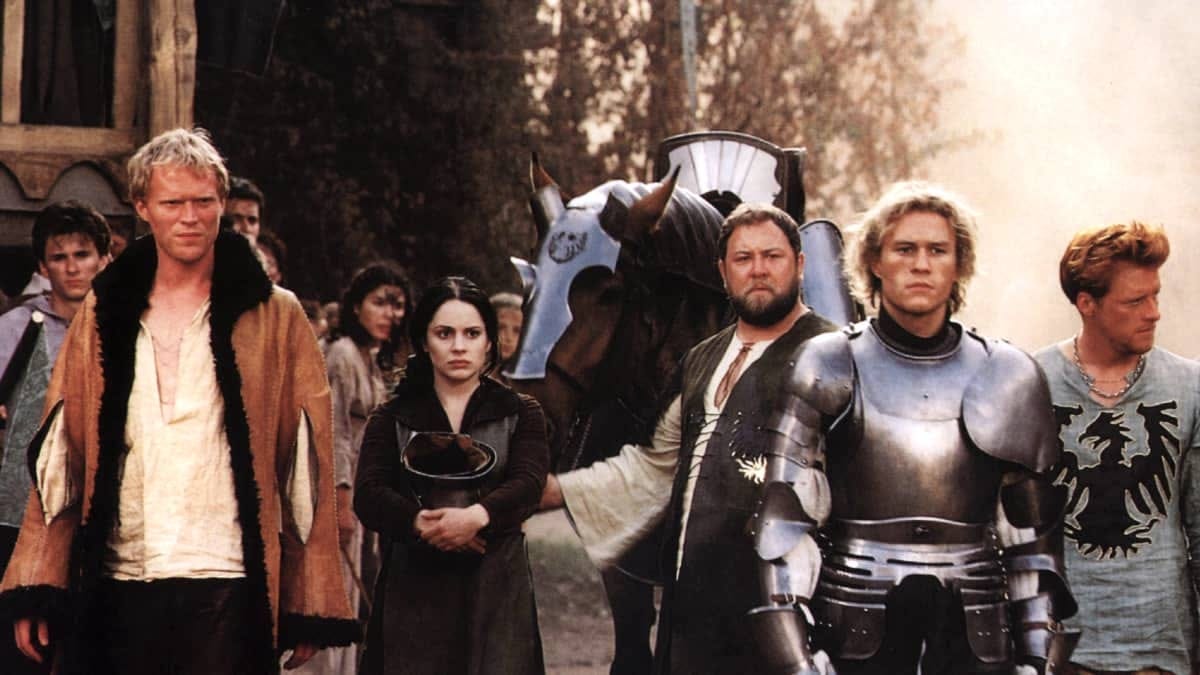Updating Classics Rocks, Just Understand Them
This week I'm wrong about a Jane Austen adaptation and a Heath Ledger movie, plus my imminent demise and a quick story about my brother
(Announcement: this is now a Tuesday newsletter because I have to work both Sundays and Mondays).
While home for Thanksgiving, my parents and I watched the recent Netflix adaptation of Persuasion, one of my favorite books and (I would argue) Jane Austen’s most mature work. The film was a disaster, despite a mostly talented cast and a few engaging moments. It’s tonally all over the place, and in an attempt to mimic Fleabag or The Office with constant fourth-wall breaking, undermines the quiet dignity of Anne Elliot, destroying the introspectiveness of the book without achieving any meaningful insight.
It’s not just Anne’s character that’s ruined—the book flattens the humor and social awareness of the book through it’s grotesque combination of Austen’s words with modern vernacular (characters are constantly rating each other on a scale of 1-10, the term “ex” is thrown around recklessly). The result is the movie doesn’t work as a satirical update of a classic or as an enriching reading of it.
It isn’t impossible to blend a literary classic with modern touches in delightful and interesting ways. She’s the Man and Ten Things I Hate About You both successfully place Shakespeare in turn-of-the-century high school settings by abandoning the original text but keeping (and cleverly twisting) the absurdity of their premises. Clueless is an Austen update that translates her social insights into a new context with a tone that draws a clear connection between them. But these adaptations avoid a lot of the problems with Persuasion by removing themselves from a period setting. Bridgerton might be a better comparison (which I will admit I have only seen parts of, and which I know has real flaws), but is more successful because it’s based on a novel written for modern audiences and doesn’t try to imbue the entire story with a self-congratulatory irony.
I want to compare Netflix’s misfire to another period film adapting a literary classic: A Knight’s Tale. The early 2000s Heath Ledger-vehicle abandons Chaucer’s Middle-English (obviously), but also abandons the story in the text entirely. Like Persuasion, it includes seemingly incongruous modern elements (the jousting spectators sing “We Will Rock You;” lads in a bar create chants for their favorite knights like they’re watching Premier League soccer; a dance seamlessly evolves from a traditional Renaissance style to groovy modern improvisation; Shannon Sossamon’s stylist had varied inspirations, none of which were medieval England).
But A Knight’s Tale works because all of its strange combinations thematically match each other and the source text. The Canterbury Tales, including A Knight’s Tale, were themselves amalgamations of seemingly mismatched tonal and literary elements. The nobility in England at the time spoke and wrote mostly in French; vernacular English was seen as lower-class and beneath the dignity of literary pursuits. By writing his poem in vernacular English, and placing characters from varied social stations and backgrounds—including women (The Wife of Bath deserves her own movie), the poor, clergy, and nobility—in the same group of pilgrims, and then treating them all with similar levels of scrutiny and empathy, Chaucer was blending linguistic and literary elements to challenge hierarchies of power and of artistic taste.
The movie similarly blends elements of sports movies (an underdog story, classic rock needle drops, an arrogant champion to challenge) with vaguely realistic period costumes and sets and contexts—and the story finds the perfect middle ground between the two, focusing on class mobility as Ledger’s character, William, pretends to be a noble to joust. Subplots also focus on social barriers—Laura Fraser’s blacksmith forges William a superior suit of armor despite being looked down on in her profession as a woman, Paul Bettany plays a hilarious interpretation of Chaucer himself (also a character in the original text) who overcomes a gambling addiction and builds William’s status by addressing his introductions to the crowd of peasants rather than the nobility (the entire cast of this movie is incredible and I don’t have time to write about them all). Actual medieval social barriers challenged (more subtly, but still) by Chaucer’s text are challenged more directly in the film in a way that also ties it to movies like Rocky or Rudy, or even with its blend of self-deprecating humor and earnestness pays homage to classics like Remember the Titans or A League of Their Own.
The villain, a typecast Rufus Sewell as a brooding English champion, argues that Ledger’s character William doesn’t belong—he doesn’t look or sound like the knight he claims to be. William, and the movie, win out through understanding and embodying the virtues of their inspirations in new ways. It is a medieval translation of a modern sports movie as well as a modern translation of a classic text. The mismatched and comedic elements work because they are all part of the deeply-felt core emotional message of the movie and its literary influence; Persuasion lacks the self-awareness to have any unifying thread beyond empty imitation of its superior forebears and contemporaries.
Anyway, you should watch A Knight’s Tale. And Clueless. And read Persuasion.
Speaking of Rock Music, A Story From Work
Yesterday was a very slow day at The Beer Garage. The combination of the weather, travel-exhaustion, and possibly Cyber Monday shopping meant I had very little company at the bar.
There was a notable exception. In the early afternoon, a man walked in carrying a box of Eggo waffles. He said he was “out shopping” (he used finger quotes) and ordered a beer. In the next half hour:
He asked who I thought would win Monday Night Football. I said the Vikings. He said “OK, whatever you say” and then bet 500 dollars on the Vikings.
When I said I was nervous about him betting that much on my suggestion, he said “OK, this one’s for you then” and bet another 25 dollars.
He told me about how he had owned and sold multiple Irish pubs around the city, where he showed rugby games because he was a former Irish National Team player.
He explained how his punk rock garage band had been the opening act for Kiss on tour in the late 90s, after getting booked without anyone actually listening to their music.
Evidently, their band was the only opener for Kiss not to get booed, because he threatened to kill the local promoter in Western Massachusetts if he went on stage, told them not to turn on the lights, and played their whole set with no breaks.
(If you’ve ever had a slightly drunk Irish-former-rock-star-rugby-player (in character, telling a story) stick his finger in your face, and say with complete conviction “I’ll fucking kill you,” then you have also met this man).
He left (and tipped very generously).
Last week, I wrote about how easily I get invested in a narrative in sports. Last night, the narrative that kept playing through my head during Monday Night Football was the Vikings losing, this man being out 525 dollars on my advice, and then murdering me.
Josh Dobbs threw four interceptions and missed a game-sealing touchdown throw and the Vikings lost on a last second field goal.
If I go missing, this is why.
Finally, A Story About My Brother
Today is my brother’s 28th birthday. Happy birthday, Malcolm! He’s currently in Costa Rica, after leading a trip through central America for Carpe Diem, a company that runs study-abroad trips for college-age students. He’s a very accomplished and responsible adult whom I love and admire very much.
But because it’s his birthday, I’m going to tell you about the time my parents were both out of town when he was in middle school, and I was put in charge of the house.
I came home after school to the smell of smoke infusing the air and maniacal laughter coming from the kitchen. Malcolm had doused his friend’s hand in bug spray, lit a match, and shot the bug spray over the match like a flamethrower to light his friend’s hand on fire. Somehow no damage was done to the house or to this innocent young boy’s hand—Malcolm insisted he had everything firmly under control.
I’m told some of the students on Malcolm’s trip occasionally read this blog, so maybe you can get him to show you his technique himself.




...overly fond of rakes and shovels as means of revenge. We ceased being feral creatures by the time I was seven and he five.
My younger brother and I had the habit of putting each other in the hospital. We were both very young when we acquired this habit but we were overly fond of rakes and shovels